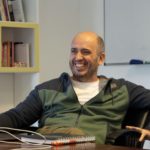Life often follows a familiar script: you’re born, you study, start working, get married, have kids, retire, and then, well, the final chapter. This has been the standard path for generations. But as our lifespans stretch longer and science teases us with the potential for even more years, I can’t help but wonder: does retirement have to be the point where we go from 100 to 0? Or can it be a new chapter full of possibilities, considering that people retire at about 60 years old but live well into their 80s and 90s?
I’ve seen some folks hit retirement and fall into a bit of a slump, feeling lost without a clear direction. I’ve also seen people who, despite still being in their working years, seem older than their age because they lack a sense of purpose and engagement. This makes me think that maybe we’re mixing up the ideas of aging and retirement in ways that aren’t helpful. It’s always surprising to hear people say they can’t wait to retire but have no plans for that time: watching TV and staying at home can get old real fast. Sure, retirement can be scary, maybe even a reminder that we’re getting older. But it doesn’t have to be dull or depressing—a mere waiting game. The word ‘retirement’ itself feels like a retreat from life, as if being tucked away in the shadows. There’s so much more we can do!
But as a design thinker, I wonder… what if we could see retirement differently, or even eliminate it as a concept? What if it was more about stepping away from a full-time job and into a continuation of our contribution to society? What if we encouraged people to stay active in new ways, in different settings? Because, let’s face it, you can be active and engaged until the very end, and that makes retirement kind of pointless as a concept.
When we let experienced folks fade into the background, we miss out on a treasure trove of knowledge and wisdom. Viewing work as just a prelude to retirement and retirement as a slow fade into the end of life really sells us short. If we started seeing these stages as evolving roles where our contributions just take on different colors, we could find more meaning and drive in everything we do.
Does retirement always mean stepping back from everything, or are there plenty of people still working who are already disconnected and unengaged from their purpose? Similar to what we’ve just discussed, those still in full-time jobs but feeling disengaged and disconnected think that their only way to contribute to society is through work, so dissatisfaction with their jobs can lead to a downward spiral. But contributing to society isn’t limited to our professional roles! Just look at the millions of volunteers who dedicate their time and skills to causes they are passionate about, to purposes they feel aligned with, to institutions that mean something to them. Recognizing the different ways we can contribute to society can help us find a purpose bigger than ourselves, helping us see our own value as individuals with something to give. This understanding can be planted in us from an early age and transform the way we interact with others.
There are many ways to transform this idea of retirement from a full stop to a semicolon. Take Germany, for example: they have some great initiatives where retirees mentor younger people, sharing their knowledge pro-bono, helping those in their working years succeed, and staying engaged in the community. And even better, it’s a private-public effort, which means the entire society sees the value they have.
And in the US, there are programs encouraging retirees to go back to school to either finish college or pursue further education. This opens up new doors, since they have the key benefit of experience to go along that new degree.
Let’s not forget about the ‘silver economy,’ where older adults are finding new business opportunities and even creating jobs, maybe for younger people. This is a space rich with potential, led by those who know the ropes and can spot opportunities others might miss.
I really believe that staying active is crucial for our mental and emotional well-being, which is why I can’t imagine myself ever just coasting. This is also what reshaping futures looks like—contributing towards this mindset change and empowering people to stay engaged and active regardless of job status. So, while I plan to let biology take its course, I’m all about living with purpose and passion. I invite you to find your purpose too, ensuring that you stay active and engaged in a life you love.
